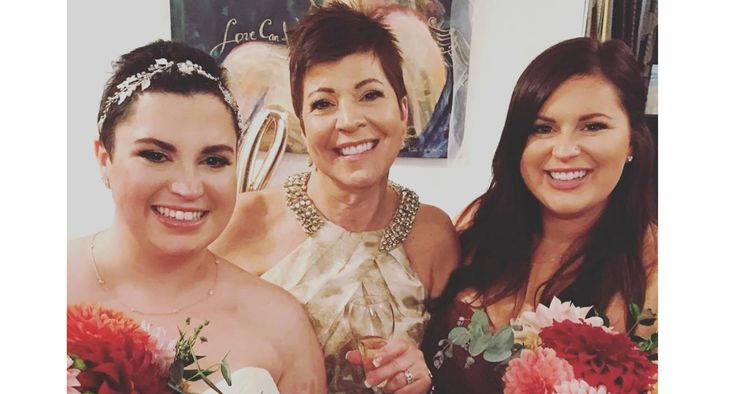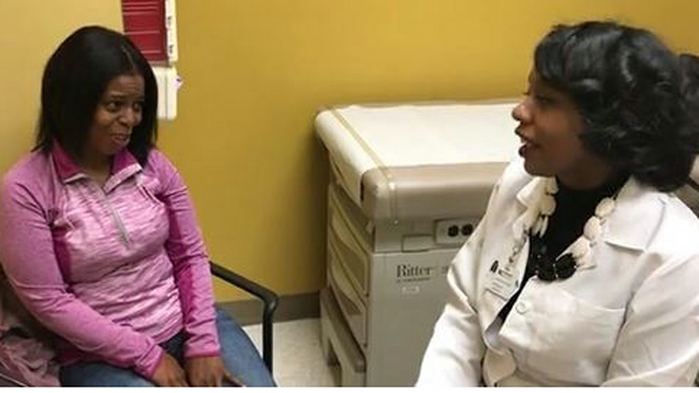Felix Bautista from Novant Health Healthy Headlines on Vimeo.
It was a special night for Felix Bautista. It was also nearly his last.
Felix, his wife Holly and their infant daughter Bailey, all went out to dinner in January 2017 to celebrate Felix’s 28th birthday with other family members. Hours later, he woke up to a terrifying sensation: The entire left side of his body was numb. “It was a tremendous headache,” Bautista recalls. “It was scary, like, ‘What’s wrong with me?’” he said.
Holly tried to relay what was happening to a nurse over the phone, but when Felix fell from the bed she hung up and called 911. An ambulance took Felix to a nearby hospital. A scan revealed a bleeding stroke (more precisely, a massive intracerebral hemorrhage), which was caused by a rare condition. Felix was airlifted north to Novant Health Forsyth Medical Center for emergency surgery.
In the following hours, Bautista’s life would hang in the balance. And it would be just the start of a harrowing yearlong journey for the young family. Today, the young father has made strides that many who know him could never have imagined. The expert care of his medical team, Bautista’s own resilience, and the support of his wife all made it possible.
‘He might not make it’
After the surgery, Holly recalled being told by a doctor that there was only a 10 to 20 percent chance her husband would survive. And even if he did, he might never be able to work again or get back to his old life. There would be no more playing adult-league baseball with his brother, Omar, in Charlotte.
Holly and Felix had begun dating each other in high school, near Salisbury, North Carolina, and they remained together through their college years at Gardner-Webb University in Boiling Springs.
Holly said she couldn’t imagine life without her husband. At the same time, she was grateful the doctors were upfront. “That was really scary, being told Felix might not make it. And I’m going, ‘My gosh we’ve got this baby to take care of. What is going on?’” Holly said.
Their daughter, Bailey, with her sweet smile and dark, curly hair, was 9 months old.
Weathering the ‘storms’
“Felix was super sick,” said Dr. Chere Gregory, a neurologist and one of the many providers responsible for Felix’s care. Gregory said Felix was far from out of the woods after brain surgery because he had what is known as “sympathetic storming” for days afterward.
Sympathetic storming is “excessive, uncontrolled activation or ‘storming,’ of the nervous system,” according to a publication by Synapse, a brain injury organization. The condition is “associated with increased risks of death, cardiac arrest, cerebral hemorrhage or elevated brain temperature, which can itself lead to further injury.” It’s also known by several other names, including neurostorming, central dysregulation, and Autonomic Dysfunction Syndrome or ADS.
The “storming” affects part of the nervous system that “tells a person’s brain to run when the lion is chasing them,” Gregory said.
In Felix’s case, doctors emphasized trying to manage his blood pressure to prevent additional bleeding and swelling. “Every time he would storm, we would worry that it might cost us some neurologic improvement,” Gregory said. “It’s not about fixing numbers on a screen but, what’s the long-term going to look like for a young dad and a young husband when they get through all this.”
Gregory said while members of her team had to tell Holly that there indeed was a strong possibility of her losing her husband, the doctor remained hopeful that Felix would beat the odds, in part because he had youth on his side.
From Holly’s perspective, Felix’s condition fluctuated by the day. “There were times several days into his time in the neuro ICU, if you would touch him anywhere, even just barely touch his hand or talk to him, he would get overly stimulated and he would kind of freak out and his heart rate would go up and his blood pressure would go up.
“Then, (the ICU staff) would say, ‘OK, you’re going to have to step away,’” Holly said. “But then there were days where he was more playful and he would try to throw a ball to you or … roll it toward the hall. You could tell that he thought it was funny even though he doesn’t remember any of it now.”
There would be many scary moments. But, eventually, the storms subsided.
“I’ve never seen somebody who’s had as bad a hemorrhage as he did and wound up walking and talking again,” said Dr. Carolyn MacDonald, one of the doctors during Felix’s stay in inpatient rehab. “They did some things in the neuro ICU that saved his life. The fact that he is alive is a miracle.”
But the journey was far from over. As he entered rehab, Felix still couldn’t walk, talk or follow commands.
’I really didn’t believe them’
Felix has no memories of the month he spent in the neuro ICU and said it took a few weeks into his stay at rehab before he even knew what was going on. “Holly told me it was a tough time for my family because the whole time they didn’t know if I was going to make it,” Felix said. “It was hard hearing that.”
It took three physical therapists to get him up and walking — one to hold him, one to move his legs and the third to follow with a wheelchair.
“They said, ‘Just keep working hard, you’re young, you’re going to recover.’ I really didn’t believe them because I still couldn’t move my left side,” Felix said. “But after I started seeing progress, that’s when I started having a will to try. It changed me.”
Felix spent a month in inpatient rehab. Shortly before he went home in March, Holly helped him visit the team that saved his life in neuro ICU.
“I turned and saw him down the hallway and I cried,” Gregory, the doctor, said. “He wasn’t just a patient. He’s the dad of the cutest baby you’ve ever seen and the husband of a really amazing and worried wife. To see him and know that he was making that kind of progress, it just swept me away.”
Felix remembers the moment. Gregory knew him well, but it was, for him, his first time meeting her. “She said, ‘You don’t know how bad you were,’” he said. “’It was a miracle.’”
A turning point
At first, Felix’s return home was a massive period of adjustment. He didn’t feel like his normal self and he still needed help getting around. It could be depressing. The ups and downs continued, but he said the in-home therapy he received late that spring and summer really started to help.
A big turning point came in the fall: the longtime Boston Red Sox fan, with Holly by his side, attended his first game at Fenway Park. Just months before, the trip would have been almost unthinkable.
“Ever since middle school and high school and college, I remember thinking I want to go to Fenway. I knew eventually I would get to go,” Felix said.
The Red Sox lost, but that was barely a footnote for Felix. “It was the sixth or seventh inning when it started raining. I stayed the whole game,” he said. “Being there was just awesome. From not being able to walk and to get to that point to be able to go was just amazing.”
Building a family bond meant to last
In November, Felix drove a car by himself for the first time since the stroke—although Holly followed him in her own car to make sure he was OK. Felix plans to return to his job soon as a process engineer at a machine/fabrication factory in Bessemer City. Felix said he’s really looking forward to getting back. He feels like he’s close to returning and is much further along than he expected.
He still has appointments each week for outpatient rehab, occupational therapy and physical therapy. “My walking is getting better,” he said. “The only things that’s holding me back a little is getting movement back on my left side and getting my left hand and left arm back to normal.”
There is a new challenge these days: Holly was recently diagnosed with Crohn’s disease, an illness that causes inflammation in her digestive tract, and Felix is now sometimes the one helping her around the house.
Holly and Felix said they’ll take on whatever life throws their way by finding strength in each other and their Christian faith. “It’s nothing like not having him here,” Holly said.
Having a father around changes everything for their daughter, Bailey, as well. Back when Felix was in the hospital, Bailey was often frightened of her father as he lay on the hospital bed surrounded by scary medical equipment. Now, Bailey will crawl up on her father’s lap in the mornings and say “Dada” and give him a kiss as they watch videos on his phone.
Felix says that Holly isn’t the glue holding their little family together, she’s the concrete. And every day he’s grateful for Bailey, too.
“For me, having all of that time in the hospital being away from Bailey and now being able to see her walk and how smart she is … it makes me want to spend as much time with her as I can,” Felix said. “She’s so close to me. I’m so happy to know she went through this with us but that she doesn’t realize how it was. But she will once she’s older.”
For details about Novant Health stroke care and services, click here.







